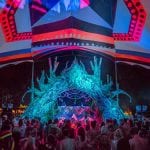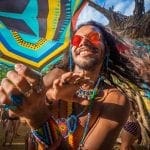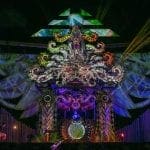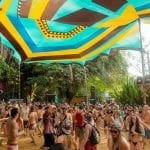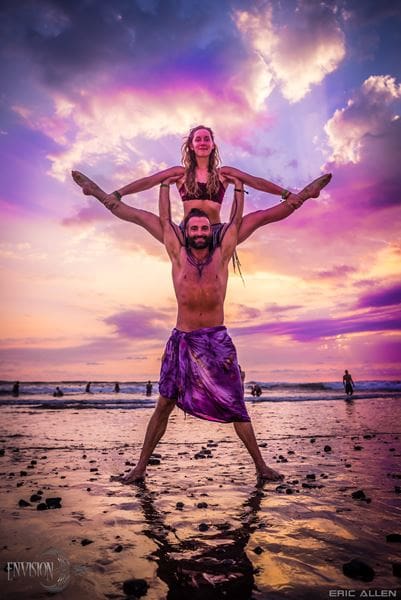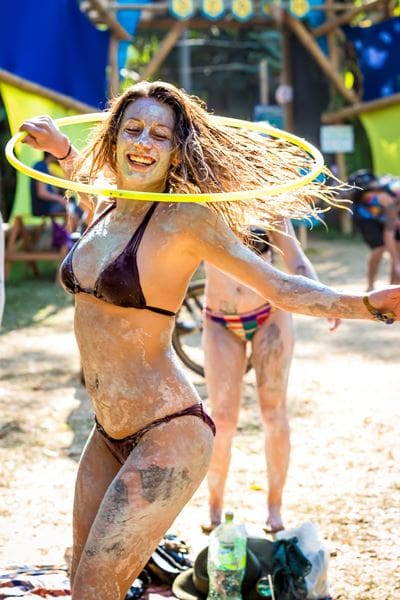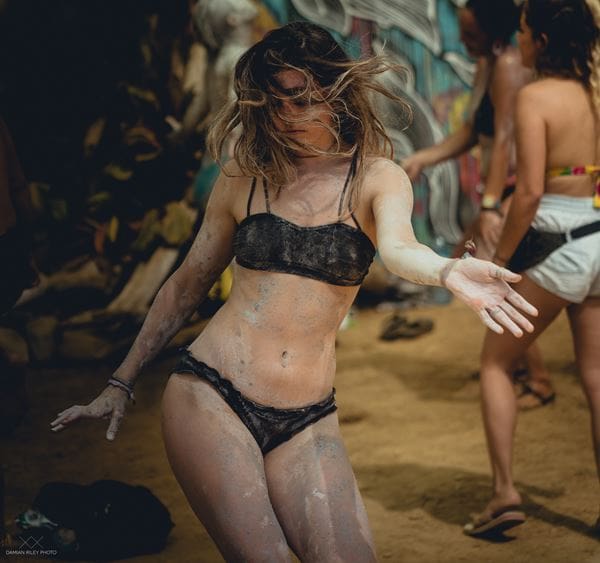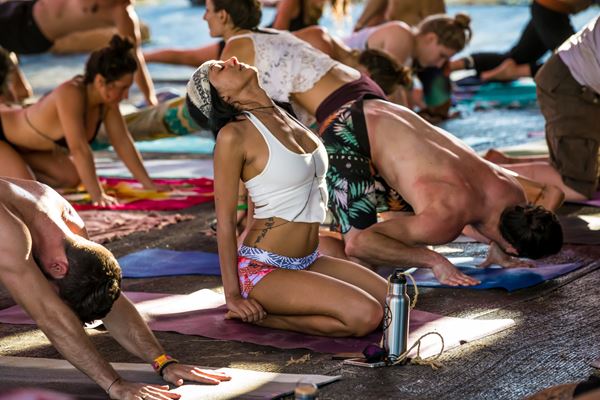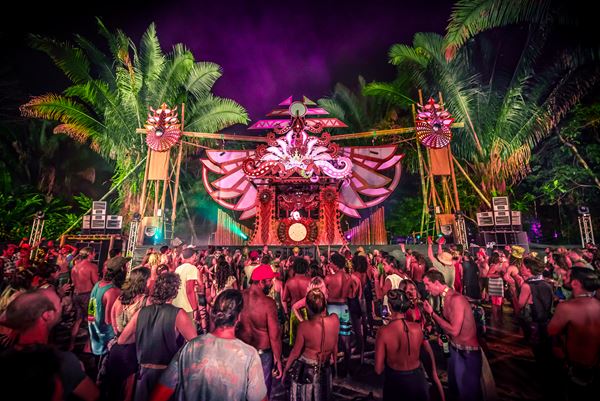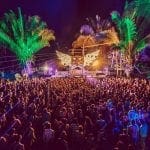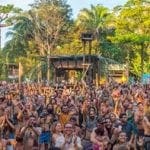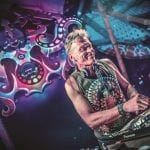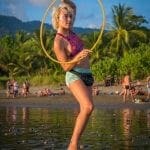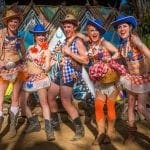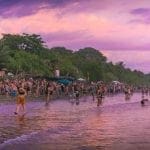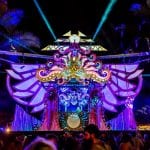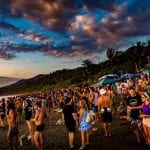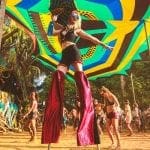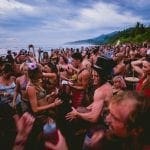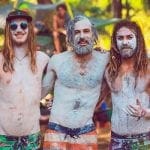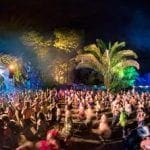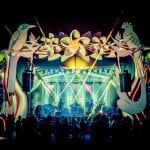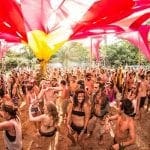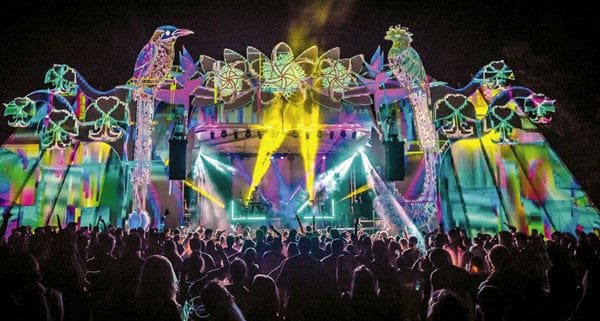
Envision: Party With a Purpose
Envision is a music festival, a dance party, a yoga, wellness and spirituality retreat, a four-day rave in the jungle by the sea — and yet it is none of those things. Because it is far more.
The organizers of the Envision festival, which takes place Feb. 22-26 on the central Pacific coast near Uvita, are not just looking to throw Costa Rica’s biggest party. They’re looking to change lives.
“The vision is to create an experience that allows people to taste how sweet it is to be living surrounded by like-minded people,” said co-founder Stephen Brooks. “It’s a community where everybody cares about each other. We try to create that vibe so that when you come you feel that and you don’t want it to be any other way.”
Now in its eighth year, Envision is hoping to welcome upwards of 5,000 people this month to a private finca between Uvita and Dominical that is transformed for four days into a mecca for yogis, fire dancers, tattooed people in tattered beachwear and other members of a far-flung tribe that considers itself a “conscious community.”
Greetings, Earthlings. Now take me to the party.
The founder
Brooks has been in Costa Rica for 22 years, and has long attended the Burning Man festival in the Nevada desert.
“I used to try to bring my Costa Rican friends to Burning Man to see what’s possible,” he said, “but I couldn’t bring all of Costa Rica to Burning Man. So I thought we’d bring Burning Man to Costa Rica.”
And so was born Envision, which has morphed into a mega-event that attracts musical and artistic talent from all over the world, with ticket prices ranging from $282 to $675.
“It’s extremely hard,” Brooks said. “There’s nothing easy about it.”
But it’s worth every drop of sweat.
Close to 100 musicians, mostly of the electronic genre, will be performing on three elaborately decorated stages. Yoga classes will be conducted from another stage. Carefully vetted food vendors will be selling mostly organic food. Workshops will be held on permaculture, wellness and a great many other topics.
Brooks says his wife organizes a workshop on herbalism and also sets up an herbal clinic that sees hundreds of patients. There’s an elixir bar, featuring tinctures made from plants on the property, and an herbal education series.
“We’re a music festival that also boasts a full-scale yoga and wellness festival,” says cofounder Josh Wendel.
Practically every hotel room and vacation rental from Quepos to Palmar Norte will be full, Brooks says, and most attendees will camp on the property where the event is held.
“Envision has become the most important festival in the country, attracting a great number of tourists who come for this experience, just to be at this festival a few days,” said Luigi Jiménez, who is responsible for lining up Latin American musical talent. “And each time more Ticos are interested in this movement, on an artistic and musical and cultural level. … It generates an economic impact that is unrivaled the rest of the year.”
The venue, a place called Rancho La Merced owned by a Costa Rican family, was formerly deforested cattle pasture. But Envision workers and volunteers have planted so many trees over the years that it’s once again a jungle. In fact, a troop of howler monkeys has moved into some of the trees, and the monkeys appear to enjoy watching people on the dance floor.
The stages are redesigned and rebuilt every year with the help of local workers. Area farmers provide organic produce and operate food stands. Others benefit by providing transportation, and local artisans set up stands to sell their handicrafts.
Even the indigenous Boruca community shows up to perform its famous “Dance of the Devils,” an imaginative re-enactment of the Spanish invasion in which men wear devil masks to scare off the Spaniards, who are represented by a man wearing a bull costume.
The builder
Degan Wilcox, 44, of Denver, has been living in Costa Rica for 16 years and is co-director of operations at Envision and director of “the build.”
He says the part of “the Village” where the staff stays consists of bamboo huts, with a commissary that serves food, and it stays up year-round. Degan said the workers here range from “admins with computers” to “Tico guys with machetes.”
And you can’t spell “party” without “art,” so …
“The stages are torn down every year and then put back up with entirely new art,” he says. “We try to reuse old art, then deco out the other parts of the festival with completely new stages and other art installations every year.”
By the time they do the “apex build,” about 10 days out from the start of the festival, Degan said there are probably 30 to 50 Costa Ricans working on-site, mostly from local communities.
“There’s a whole cooking staff, cleaning staff, cleaning ladies,” he said. “Toward the end the extranjeros come in, and there’s usually some big lifting on some of the stage builds, the design, the big art pieces.”
So how does Envision feed 5,000+ people, a great many of whom will be arriving by airplane from other countries, and will not be bringing their own food, Burning Man-style?
“We source the food, which is mostly organic, a farm-to-table concept, specifically for the staff,” he said — and “the staff” might be up to 1,500 people, including the artists.
For the larger masses, there’s a food court.
“At the event itself, all the humans mostly eat at the food court, which is almost entirely made up of local restaurants, or in some cases a family that does it once a year,” Degan said.
The same vendors are used every year, 90 percent of them local, he said. Food that’s 100 percent organic is not possible in this country at an event of this scale, he said, but organizers work directly with farmers and ranchers to ensure that the food is as pure as possible.
Clean and green
Then there’s the issue of sustainability. Envision starts with the tenet “First, do no harm.”
Where some festivals leave behind piles of trash, this one strives for a net positive impact on its environment. Single-use plastic is prohibited, and there are no trash cans in the camping area. Elsewhere, there is recycling with several sorting options, and all food waste is composted and returned to the earth or donated to local farms.
Among the initiatives that strive for a positive impact on the community is an investment in clean water.
“Every year for five or six years now, we have made large donations to the water system for the Uvita watershed,” Degan said. “We helped them build one of the new water tanks for Uvita, and since then we’ve donated on two or three pipeline jobs from other nacientes, other springs. We do that every year because water is primordial and we double the population of Uvita for a week.”
Degan said Envision also contributes every year to some kind of education, be it a youth center, an after-school program or some other opportunity for Uvita youth. It also sponsors environmental education and beach cleanups as part of its community outreach programs.
Also, it plants lots and lots of trees. Which can’t be a bad thing.
“We strive to walk lighter and be shining examples of another way to do things,” Brooks said.
BOOK NOW BANNER HERE

